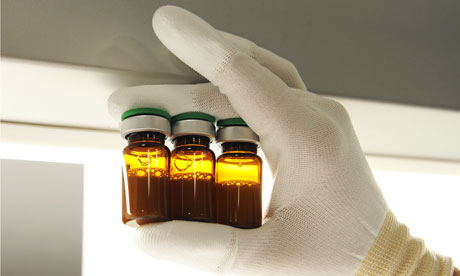
Rich countries, led by Britain, have pledged £2.6bn to a fund to pay for vaccinations to prevent children in poor countries dying from common conditions – £370m more than they were asked for.
Months of lobbying led to what the UK development secretary, Andrew Mitchell, called a "historic" session to replenish the Global Alliance for Vaccines and Immunisation (Gavi) in London.
David Cameron led the field, pledging £814m to vaccinate more than 80 million children, which he said would help save an estimated 1.4 million lives from common conditions such as pneumonia and diarrhoea.
"Britain will play its full part," Cameron told the conference, where politicians, charities, private companies and philanthropists including Bill Gates of Microsoft had gathered.
Richer countries were urged to give an extra £2.3bn by 2015, which Gavi says is enough to save 4 million children's lives.
Gates and Cameron said that vaccines were one of the most cost-effective ways of delivering aid and pointed out that 80% of the money given to Gavi goes into actual immunisation programmes on the ground.
Gates, who is jointly hosting the conference with Cameron, pledged $1bn (£610m). Other significant pledges came from Japan, Brazil and Australia.
Cameron said: "In addition to our existing support for Gavi, we will provide £814m of new funding up to 2015.
"This will help vaccinate over 80 million children and save 1.4 million lives. That is one child vaccinated every two seconds for five years. It is one child's life saved every two minutes. That is what the money that the British taxpayer is putting in will give."
He said the idea of children dying of preventable conditions such as pneumonia and diarrhoea should be "unthinkable" in 2011.
"To those who say fine, but we should put off seeing through those promises to another day because right now we can't afford to help, I say – we can't afford to wait."
The UK is already committed to giving £2bn over the next 30 years.
In an article in the Observer Cameron defended the decision amid backbench Tory unease about increasing overseas aid at a time of such sharp domestic cuts.
It was a controversial decision, he said, but it was right both morally and in the national interest to invest in countries "before they become broken", and avoiding spending far more on the problems that could result.
Health experts estimate that three times as many children under five die from the conditions as from malaria and HIV/Aids combined.
Announcing the vaccine funding, Cameron said there was also a "strong practical" argument for aid as it would help transform poorer countries in Africa into trading partners for the UK and would prevent the conditions which lead to mass migration, radicalisation and terrorism.
"If we invest in countries before they get broken, we might not end up spending so much on dealing with the problems, whether that's immigration or new threats to our national security," he said.
"I actually think that most people in our country want Britain to stand for something in the world, to be something in the world.
"When I think about what makes me proud of our country, I think of our incredibly brave servicemen and women and of our capabilities as an economic and diplomatic power, but I also think of our sense of duty to help others. That says something about this country and I think it's something we can be proud of."
He conceded that worries about corruption in overseas aid were legitimate. "I totally get this argument," he said. "It's right to be angry when aid is badly spent. Let me tell you: I'm not prepared to see a single penny of hard-earned money wasted on corrupt governments, or badly spent aid.
"But the answer isn't to walk away from aid. It's to change the way we do development – so that we get real results and real value for money."
Gates told the event that a malaria vaccine could be just a few years away, while polio could follow smallpox in being eradicated thanks to the success of its vaccine.
Vaccines are "magic", he said. "They are very inexpensive, they can protect you for your entire life, so diseases like smallpox that used to kill millions are completely gone because of the vaccine.
"It's the greatest thing that ever happened in human health. We need to get them out to people and invent some more."

